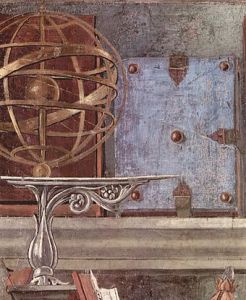Gerbert de Aurillac, later known as Pope Sylvester II, was a talented French mathematics teacher who played an important role in bringing mathematics, science, medicine, and new technologies into Europe in the 10th century. These contributions were accompanied by efforts at social advancement, but in both arenas de Aurillac’s ultimate failure offers an important lesson for all of us today.

De Aurillac’s most important contribution was the decimal system, including the Hindu-Arabic numeral system we use today, but he also (re-)introduced the abacus, study of Arab and Greco-Roman arithmetic, astronomical studies, and the armillary sphere (a physical model of objects in the sky). Some credit him with the invention of the first mechanical clock (at least in Europe), one that used a pendulum to keep track of the time.
These ideas were not created de novo, but developed within a rich cultural milieu. A vibrant culture, nurtured by Islam, flourished in Spain, especially in Andalusia, from the coming of the Arabs in 711 until their expulsion in 1492. Spain was a home for Christians, Jews, and Muslims who interacted peacefully and learned from one another.
De Aurillac most likely studied at the abbey of Santa Maria de Ripoll, in the mountains of northeastern Spain. While there, he encountered texts from the Greek and Roman times, as well as Arabic texts, Visigoth texts, and many others. He recognized the vital role played by the world of Islam and would support what we would call multiculturalism today, as well as the development of a scientific community.

But this was not to last.
De Aurillac, as Sylvester II, was the first Frenchman to become pope. As such, he was deemed a “foreigner,” who did not deserve that position. His celebration of ancient and foreign ideas was no doubt a further obstacle to his acceptance.
But the larger problem he faced was age-old greed and the desire for power. His opponents sought to demonize him.
While he was studying mathematics and astrology in Córdoba and Seville, he was accused of learning sorcery. He supposedly stole a book of spells from an Arab philosopher. The demonization of Sylvester the individual drew from and reinforced the general fear of Islam.
Along with the rejection of “foreigners” and “foreign” culture, there was a rejection of mathematics, science, and new technologies. The magnificent bounty that the Islamic world offered to Europe was largely rejected.

By the end of the 11th century, the new powers within the church and European society enforced a theocracy, instituted the crusades, and before long, the Inquisition. Although the term “dark ages” is not appropriate, there was definitely a loss. Science was retarded, and the rich interchange of ideas diminished. This period lasted half a millennium, until the time of Galileo and Copernicus.
It was no outside force, but Europe itself that brought that on.
What about today? We see a similar xenophobia, the demonization of others, insatiable greed, violent efforts to obtain power, a rejection of science and mathematics, indeed of all forms of learning, and a subordination of civil society to particular religious doctrines.
Gerbert de Aurillac would recognize this pattern well. He failed against the onslaught of forces that cared little about learning, about other cultures, or peaceful, associated life. Will we do the same?
